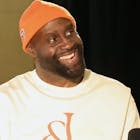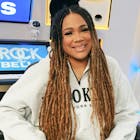
The Oral History of the Native Tongues
The Oral History of the Native Tongues
By Alec Banks
Published Fri, June 30, 2023 at 11:40 AM EDT
The Native Tongues collective is the rare crew with a storied legacy, despite having a paltry, one-song discography as an entire unit.
Why? Perhaps they are a shining example of the sum being greater than the parts. Perhaps it’s because they showed a generation of Hip-Hop heads that participation didn’t rely on a certain upbringing or style aesthetic. Or, perhaps, it was just because they were so fuckin’ cool.
This oral history, comprised of archival sources and new interviews, explores Native Tongues' origins, and the flowers that bloomed as a result of their contributions.
WHO:
Afrika Baby Bam (Jungle Brothers)
Mike Gee (Jungle Brothers)
Q-Tip (A Tribe Called Quest)
Ali Shaheed Muhammad (A Tribe Called Quest)
Posdnuos (De La Soul)
Maseo (De La Soul)
Trugoy the Dove (De La Soul)
Prince Paul (Stetsasonic)
DJ Red Alert (KISS FM)
Dante Ross (Tommy Boy Records)
KRS-One (Boogie Down Productions)
Monie Love (Artist)
Tyler, The Creator (Artist)
Pharrell Williams (Artist/Producer)
Sadat X (Brand Nubian)
Salaam Remi (Producer)
Talib Kweli (Black Star)
Jungle Brothers (Mike Gee and Afrika Baby Bam), Q-Tip, and Ali Shaheed Muhammad attend Murray Bergtraum High School in Manhattan.
Afrika Baby Bam (Jungle Brothers): Murry Bergtraum was a high school for business. It wasn't for fostering the arts. It was a TV production class, and there were talent shows and variety shows. But it wasn't a music and art school or a performing arts school.
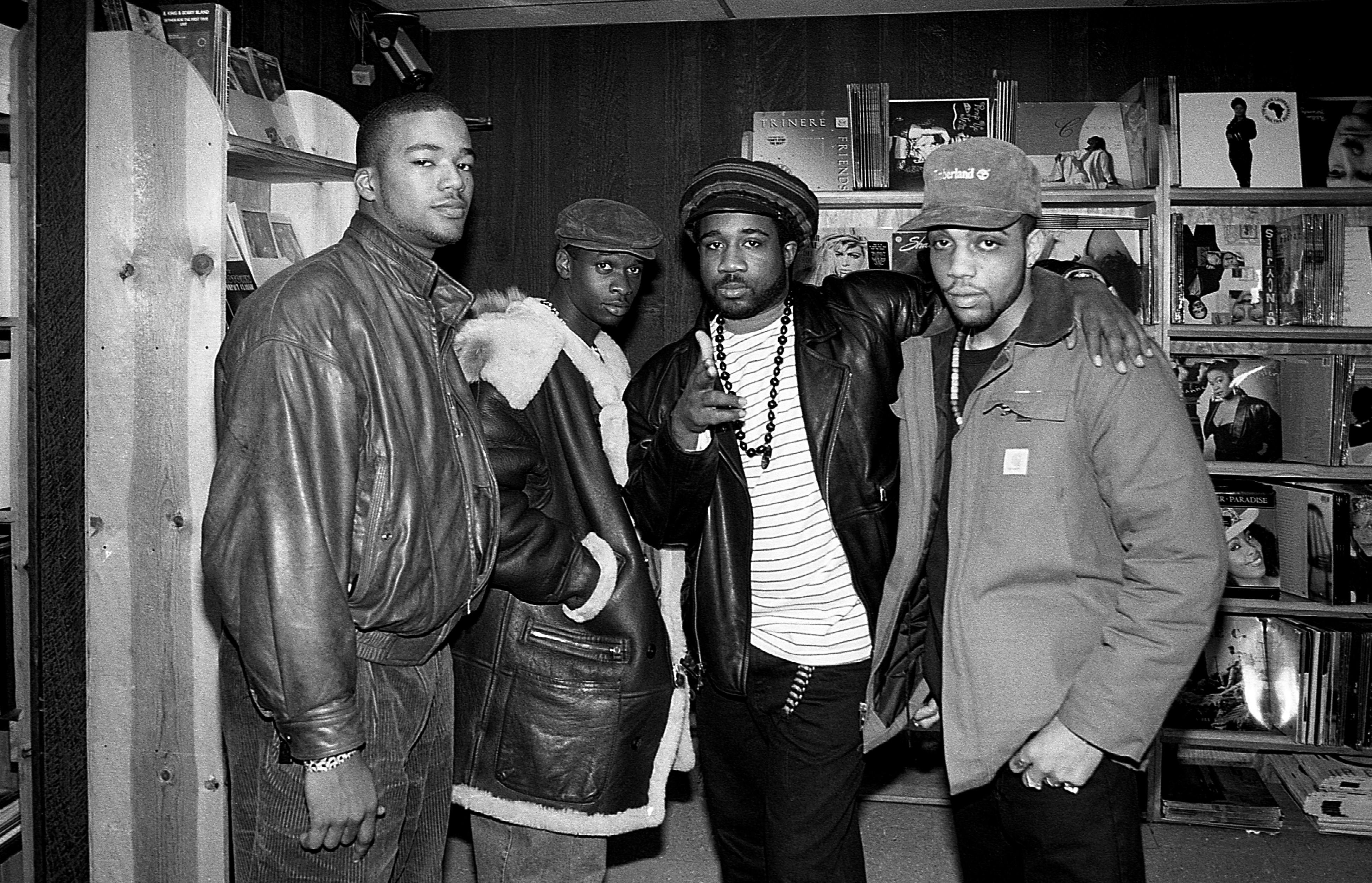
Q-Tip (A Tribe Called Quest): My neighborhood was pretty tough. And, my zone high school was Andrew Jackson, and Andrew Jackson, I remember that shit just always being on the news and was, besides Bishop Loughlin back then, one of the craziest high schools. I was like, “I am not going there.”
I wound up going to Murry Bergtraum High School, which was like a specialized high school. It was for business careers. You had to get a recommendation to get in there, have like a B average and all that shit.
Afrika Baby Bam: I spent about a year and a half working on music in my living room, DJing, because I got turntables in my second year in high school before I met Mike. I was working on what I thought was going to become a record. I would just come home after school, backspin breaks, record and make tapes, record my rhymes onto the tapes, [and] make pause tapes.
Q-Tip: I think at the time, we were just blessed to be able to be at the right time at the right place, that’s part of it. But also, prior, I guess to us, you were starting to see different shades of Black complexity through this music. On this initial implosion from the early ‘70s up into the ‘80s, it was kind of like a smaller dimension. But like most things that grow, it started to widen.
Afrika Baby Bam: At the time, [Q-Tip] was rhyming more like LL COOL J. Because we was in the same grade together. We had the same homeroom together. But I didn't really connect with him until the second year.
It was little by little. It was like drip feed. It was, "Okay, you freestyling a little bit and you telling me people say, you know, you sound like LL COOL J." I'm, "You still got to come into your own, but I like what you're doing." That was when it was all the big vocabulary words, descendants to Kool Moe Dee.
Using the big vocabulary words, going over your head, was the way that you showed you had skills. So I didn't see anything wrong with it. But then in the 11th grade, he started bringing the demos in. A couple of demos. And it was starting to get more smoothed out and less like the LL "Rock The Bells" type of thing. And more like the funk and soul vibe.
Q-Tip: I managed to get in there and when I got there I went to freshman orientation and I first met Brother J, whose name is Jason Hunter. And for those of you who don’t know, Brother J was the lead MC of this crew called the X-Clan which was poppin’ back then.
Afrika Baby Bam: [Mike Gee] had the big, black bubble goose on. He was in the classroom right across from me. I never forget the day I met him. I go over and I'm, "Yo, I want to be in this talent show. Everybody say I got to check with you."
So he's, "All right. After class, we going to be in that staircase over there. We going to have a little jam session and see what we could do." So we go in there, the four of us, Brother J's on the beatbox. So we do this whole freestyle thing or whatever and then everybody's, "Oh, word. Yeah, we going to do this. We going to do this." One by one, everybody dropped off except Brother J and Mike Gee. And that's how we wind up being in the group together.
Q-Tip: I met Shazam who was Afrika from the Jungle Brothers and Mike Gee who was also from the Jungle Brothers, I met him there. His uncle was Red Alert, famed New York DJ from the Zulu Nation. And I met Ali in Bergtraum as well, it was just a lot of MCs up there. And we did this in high school too, we did “The Promo,” that was the first record. Afrika and I produced that record together.
Jungle Brothers work with Q-Tip on their debut, 'Straight Out The Jungle'
Afrika Baby Bam: We [were] going into the studio to do Straight Out the Jungle. We had a couple of singles out and stuff like that, so towards the end of the album I said, "Why don't you come to the studio?" Because one of the demos [Q-Tip] played me was “Black Is Black."
He played me that and I was, "That's funky. That's cool. We could work with that. You should come to the studio and let's finish the verses. You know, get Mike a verse, get me a verse, reproduce the track." Organic. Out in Coney Island, Neptune Avenue. Down in the basement.
So it was Tony D and Oswald. By day, they were carpenters, so they were doing construction and all that. And by night, they was running the studio in the basement.
I had a little Dr. Rhythm drum machine, and I had a Casio keyboard, but I wasn't working with MIDI or Synthi or playing well enough to go straight to tape and a couple of takes.
I wanted to use the tools that I was more familiar with to get comfortable with making the records the way I wanted to in the studio, and they had turntables in there, which went straight into the board into the 16-track machine and I was able to punch in and piece together my loops that way. So, most of the Straight Out the Jungle was made off the turntables, which, I thought, was really cool because it was like you're DJing.
I remember me and Q-Tip doing a few takes of playing the hi-hats down and then doing a few takes of playing the drums down, punching in on that until we had five minutes' worth of recording, instrumental, and then go on a booth and do the vocals over that. So, again, that organic process is what was most memorable to me.
Salaam Remi (Producer): Growing up as a kid in New York at that time, what I taped off the radio was my fuel to get me to school. It was my gas and my bus pass. Walkman and bus pass is what got me to school. It wasn't just a bus pass. Being able to get through the cold, you had to make your tape at the weekend because Hip-Hop was only being played on Friday and Saturday nights and hopefully, you tape good stuff. Red Alert being family to the Jungle Brothers would always play certain Jungle Brothers records. There was certain songs that definitely pushed it there, but I'm sure the first one I ever heard was “Jimbrowski,” which made me go, "What in the word? What's a Jimbrowski? Who are these people, and what's happening?" They were also in an amazing push to the culture because it's always about not who's the fruit at the end of the tree, but who's actually going to start something that makes everybody wonder how to move forward, and Jungle Brothers definitely did that.
Mike Gee (Jungle Brothers): Red was involved with a lot of breaking records, and we were his first to manage. Then he did the compilation album, so that was the production he was doing as well as helping produce our first and second albums.
DROP YOUR EMAIL
TO STAY IN THE KNOW
Jungle Brothers hear De La Soul’s “Plug Tunin.’” DJ Maseo was already signed to Tommy Boy on a singles-only deal. The record exploded in 1988, and Tommy Boy offered the trio an album deal, and that song became the lead single of De La’s groundbreaking1989 debut LP, 3 Feet High and Rising.
Afrika Baby Bam: Q-Tip was there, Mike was there. We started going to the studio. I remember Red Alert gave me a demo of De La's old cassette of “Plug Tunin.'” Because we used to have listening sessions sometimes and he'd be, "Tell me what you think of that record." And it was an honor to have him ask me that because it's like, "Dude, I've taped you off the radio."
Maseo (De La Soul): That was a milestone. I was like, I arrived. If Red is playing it, if Marley [Marl) is playing it. I arrived. I'm finally in this respected game called Hip-Hop and it had nothing to do with money. It was had a lot to do with acknowledgement and respect.
Afrika Baby Bam: It was a clear cassette with the blue labeling on it. The first thing I said was, "This is a Spanish Hip-Hop group. Okay, let's check this out."
Maseo: Being called “De La Soul” and there's no videos, no promo pictures. Everybody thought we were Puerto Rican. Our first in-store was in the Bronx. The first in store was in the Bronx. Everybody music's Puerto Rican. Yeah. And it's easy to mistake me for being Dominican or something like that. So bad dudes come up to me talking Spanish and I'll be like, "Bro, I don't, I don't speak Spanish."
Afrika Baby Bam: And I put it in and it was in English and it had the midnight theme break beat on it. And I was, "Oh, they know what's up." Because break beats was the thing back in the... Octopus Breaks, Ultimate Breaks. So I was... That's the tools of the jam.
Maseo: There was a common language amongst us just being students in class. These are my friends I could laugh and joke with, do silly stuff with. It had nothing to do with, you could check your ego at the door and just be friends. And the music is what we developed our friendship over. So what was coming out was speaking to me. I understood what they were saying regardless of how eccentric or eclectic or the wordsmith of similes and all of that. It spoke to me and the music that I felt like I was coming with, lent to it as well. We just had a synergy that was building.
Posdunous (De La Soul): Dave was still in school. I was still in school. By the time we got around Apollos, I was still in school. The reason why I left college is because Lyor Cohen came to my college and was like, look, what do you want to do? Do you want to be a superstar?
Prince Paul (De La Soul/Stetsasonic): De La really had this affinity for the Jungle Brothers. They were into them, like, “Yo, they’re kinda like us.”
Pharrell Williams (Producer/Artist/Designer): The De La tribe were the forefathers and founders of the way we see things. I was nearly 16 when 3 Feet High and Rising came out. It was a total game-changer. It changed my life, period.

Queen Latifah and The 45 King link
Queen Latifah: DJ Mark the 45 King and I did a demo, and he gave a copy to Fab Five Freddie, who played it over the phone to someone at Tommy Boy Records, and that was it.
Dante Ross (Tommy Boy Records): I loved when Latifah did “Mama Gave Birth to the Soul Children.” I thought that was really cool. And it was just nice to see everyone get along and rock with each other. It was really cool. It was a really special time. We were all so young. I'm slightly older than those guys, but we were babies.I didn't go to college. I went to Hip-Hop, and this was my college experience, in a sense.
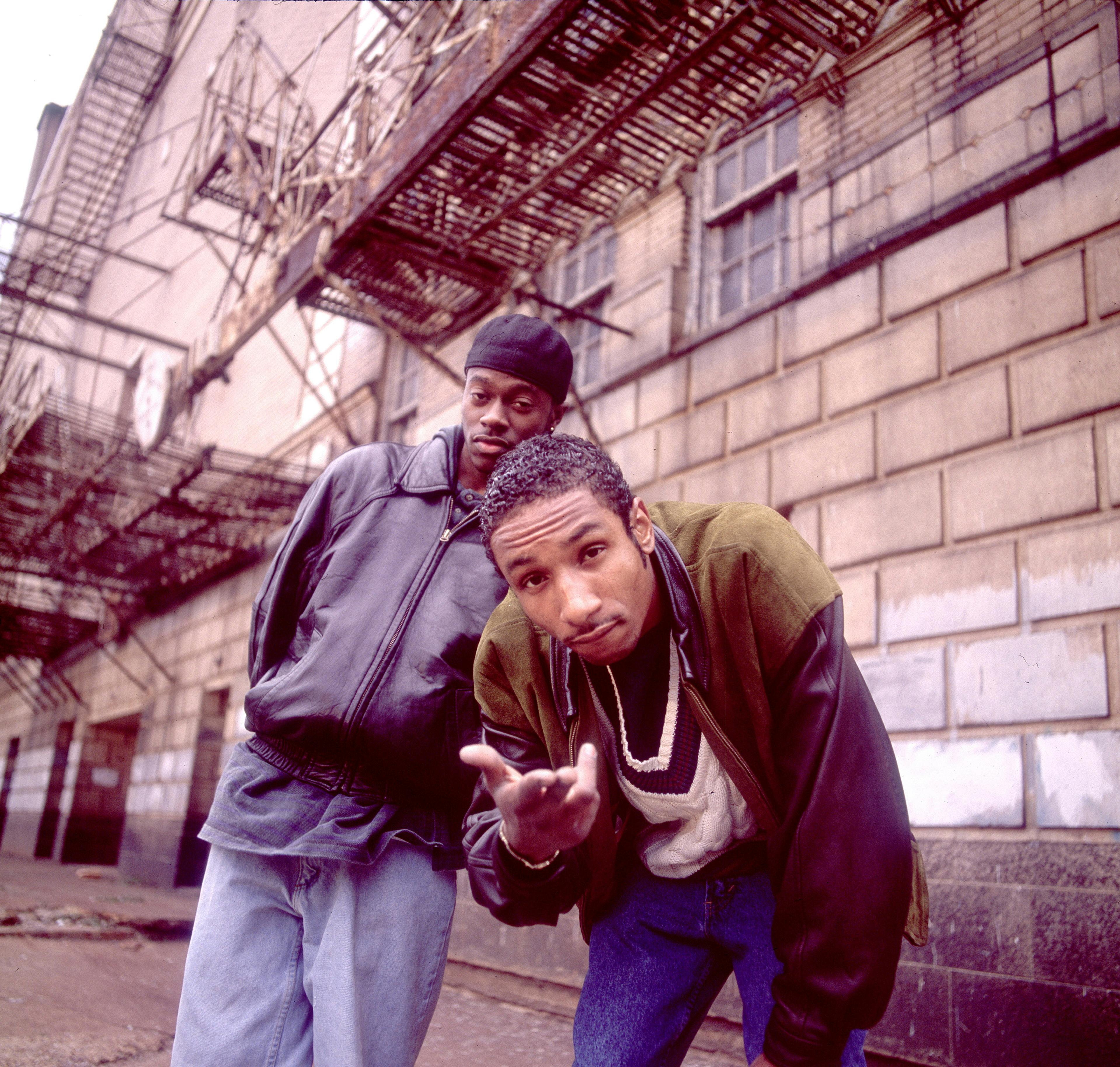
Black Sheep forms in North Carolina
Dres (Black Sheep): When I get my senior year in high school, we moved to another little spot. And I met Lawgne. We had a mutual friend, this cat named Stan. Stan was from the Bronx and he was my man. We was both from New York in Carolina. So we was really holding it down. And we had a little man by the name of Shorty Do-op. Shorty Do-op was Lawgne. Lawnge was so small he had to stand on milk crates to cut. But he was the nicest DJ any of us ever seen. He was beyond nice, you know what I'm saying? So that was our little crew, you know what I'm saying? My cousin F was down there, Big shot, the big F for Boom Bash. You know what I'm saying? Just to say. So we was running around down there, kind of doing the New York thing in Carolina, really holding it down. And long story short, Red Alert had a show down there with Sparky D and the Real Roxanne. And Red was the host. So we had Little Juice at the arena and in Raleigh, my man Craze from the Bronx was one of the promoters. We was able to get Lawnge on stage before.
He's so little, everybody's bugging out, but he's dumb nice. So Red approaches him like, “Yo, like yo, who are like this, that, and there. He's like, yo Shorty Do-op. I'm from Brooklyn, but I live down here. But I come up every summer." So Red gives him a number. Like, "Yo, well when you come up, get up with me."
So that summer, Lawgne goes up, Red has him in the studio. You know how Red is Red? Red grabs him, starts running him around, and Red has him in the studio for the Jungle Brothers' first album. The making of their first album. You know what I'm saying? So that's when Lawgne gets introduced to the clique. So every summer he's coming back and forth. Unbeknownst to me, because I don't finish school, I'm, I'm doing a hundred different things, bumping my head, doing some things, doing some things wrong.
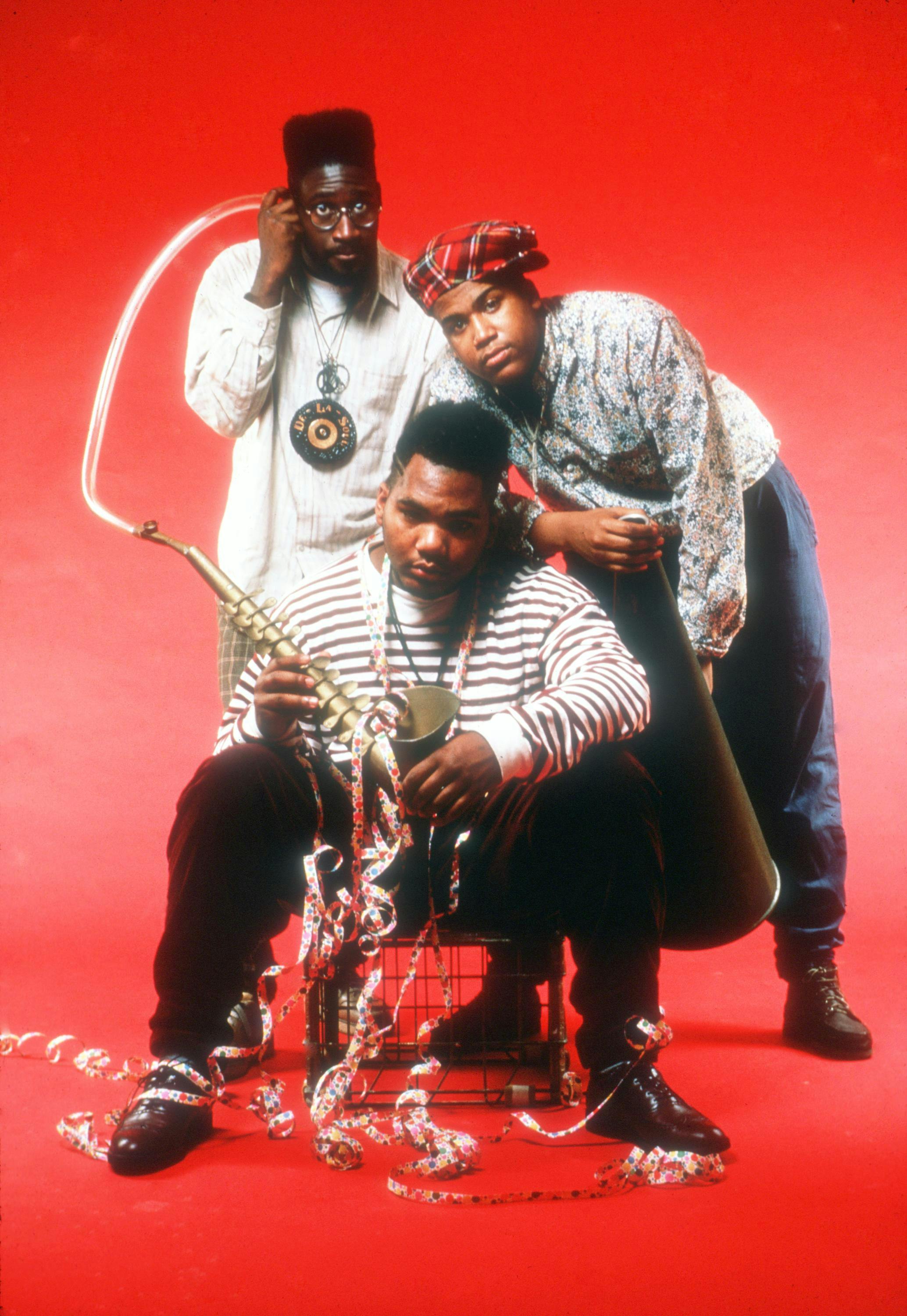
The Boston show
Afrika Baby Bam: We did a show with [De La Soul] in Boston and I was already prepped. I watched the show and I was, "Dude, it's like we one, happy family on stage. We another version of each other." So I called up Q-Tip because it was in Boston. I think I had a cell phone that time and I was coming in and I was, "Yo, really quick. We just did this show with De La Soul. You got to meet these guys, you going to love them like family. They're just on the same vibe we on."
And we met in the... I don't know exactly where I introduced them. I don't know if it was in the street, studio or club or whatever. But they hit it right off. That's how he wind up doing “Me, Myself and I,” which is patterned after “Black is Black.”
Prince Paul: When they met, they were like fast friends.
Maseo (De La Soul): One new family being built.
Afrika Baby Bam: Right after that, in the studio, Q-Tip was, "We need a name for the collective." Because people starting to... I was the guy they would come to for names.
And he said the word "native." And I said "tongue" because we all speak in our own language. We always should say that. We got these inside jokes, we got coded words, we got our own slang. We speak in our own tongue. Native Tongues.
Q-Tip: I remember Afrika [Baby Bam] called me that night, like, two in the morning. “Yo these kids, De La Soul, you gotta meet ‘em! I swear we’re just alike!” I went there, met them, and it was just fuckin’ love at first sight. It was disgusting. In Hip-Hop, it praises individualism. I think that’s the main achievement of the Native Tongues. It just showed people could come together.
Posdnous: We were all just happy to be involved with the music. Coming in and signing with Tommy Boy, we immediately started to be around people like Milk and Giz (Audio Two) and MC Lyte. So Jungle wasn’t anything different. When we had a show in Boston and performed with Jungle Brothers, we let each other know how much we loved each other’s music. And after that show, we were like, “We have a studio session. Come by.” And it just so happened to be the day we were doing “Buddy.”
Prince Paul: Well, let me just start off by saying that the first time I heard of Native Tongues, and I don't think he ever gets enough credit, is Afrika Baby Bam from Jungle Brothers. He's the one who started it. And who more or less adopted Tribe Called Quest would probably be the first, aside from Jungle Brothers, then De La Soul. And then after that, I couldn't tell you in what order who came when, maybe it was Queen Latifah because she was part of Tommy Boy, which led her to meet us, which kind of put her in the collective.
“Buddy”
Prince Paul: That definitely put everybody in the room together. I mean the original "Buddy" was on the 3 Feet High and Rising album. And then the remix of "Buddy," which was the popular one, which was the video that everybody knows is the one that has everybody. Because I think the original one probably just had Jungle Brothers.
Ali Shaheed Muhammad (A Tribe Called Quest): We, the Native Tongues, we used to go out to clubs and hang out and have the best time. Like, oh my god. Every time we got together. If you listen to the lyrics of "Buddy" by De La Soul, it is literal, very literal. And the Jungle Brothers and De La Soul, they kind of preceded us by a few months in terms of recording an album and putting music out. So, for us, we were kind of late but we were still in the same — we were there together doing the exact same thing.
Trugoy: I think that it's kind of funny how people create this big thing about, "Native Tongues, Native Tongues," when it only really stems off of one record, nothing more than that. Maybe identifying that it was a real relationship, a true friendship, a true connection. But musically, the successful end of that, all we really got to hold onto is “Buddy.”
Dante Ross (Tommy Boy Records): “Buddy” would be the apex of it, maybe. And to me, it was wonderful. It was one of the greatest moments of music at the center of the Golden Age, and one of the greatest examples of artistry and Hip-Hop in my opinion.
Peripheral members
Sadat X (Brand Nubian): We was all together, man. At that point, Brand Nubian was doing a lot of shows with De La, we were doing shows with Tribe and everybody vibed. Hopefully it's coming back around to that. And when we were doing it, if somebody had a session, if De La had a session or Dres had a session, somebody had a session, you just might casually stop by and chill and add to the ambience of the room.
I would say we might be a auxiliary member because Brand Nubian stands on our own. We connected with a lot of people, but we basically stand on our own. But we are auxiliary members of the whole movement and glad to be affiliated with them. All of them are very good friends, but Brand Nubian stands on its own.
Dante Ross (Tommy Boy Records): There's the adjacent members. Brand Nubians and KMD were adjacent. Hieroglyphics is affiliated. I think Common is an official member.
Prince Paul: The whole thing about Native Tongue, it was just really organic. It was a name and then after a while, it was identified as a collective like, "Yo we are Native Tongue." It consists of whoever's in the room at the time. And that's the way it was. Like we would be in the studio — we being and I can only speak for De LA Soul — and then randomly you'd have the Jungle Brothers in there. You'd have Red Alert. At one point MC Lyte was probably in the studio and then you have Tribe is in there.
I was a part of that collective. And I think just by default, I think by being in the room. I can't even say to you honestly to this day, "Hi, I'm Prince Paul, I am part of Native Tongues." You might ask somebody in the group, they're like, "Nah Paul, he ain't. You might ask somebody else and go, "Yeah, he's part of it."
Chris Lighty
Chris Lighty (Rush/Violator Management): I was tour manager for Jungle Brothers/DJ/take out the garbage/show up at the studio. So it was more than just tour managing. And then the Jungle Brothers led me to meeting A Tribe Called Quest, Q-Tip, Ali Phife and those guys, and then De La Soul. And that actually led to Lyor looking for me via the fact that we had all these groups popping. We were traveling all around the world and he wasn't a part of it. Lyor came looking. And also Lyor was a big fan of Criminal Minded and Boogie Down Productions. And I was running with Scott La Rock and those guys. And Scott was a good friend of mine, so he wanted to just know anybody that was part of the whole Criminal Minded movement and the whole Boogie Down Production movement. So we wound up getting together and talking about being part of Rush.
Mike Gee: As a personality DJing allover the place and doing radio, then trying to manage us, I think just became too much and it was good that Chris Lighty stepped in.
KRS-One (Boogie Down Productions): Chris is a good friend. We didn’t always agree, but the respect between us remained strong right up to his passing. I find myself missing his voice, and his sincere advocacy for Hip-Hop.
Monie Love (Artist): Rest in peace, Chris Lighty. He orchestrated that [Native Tongues] photo shoot. And he just was, "Pick an instrument that makes sense to you." He said that to me. So I went and sat on the drums, because I played drums in high school in England. In Catholic school, I played the drums. So immediately, he was like, "Pick an instrument that makes sense to you."
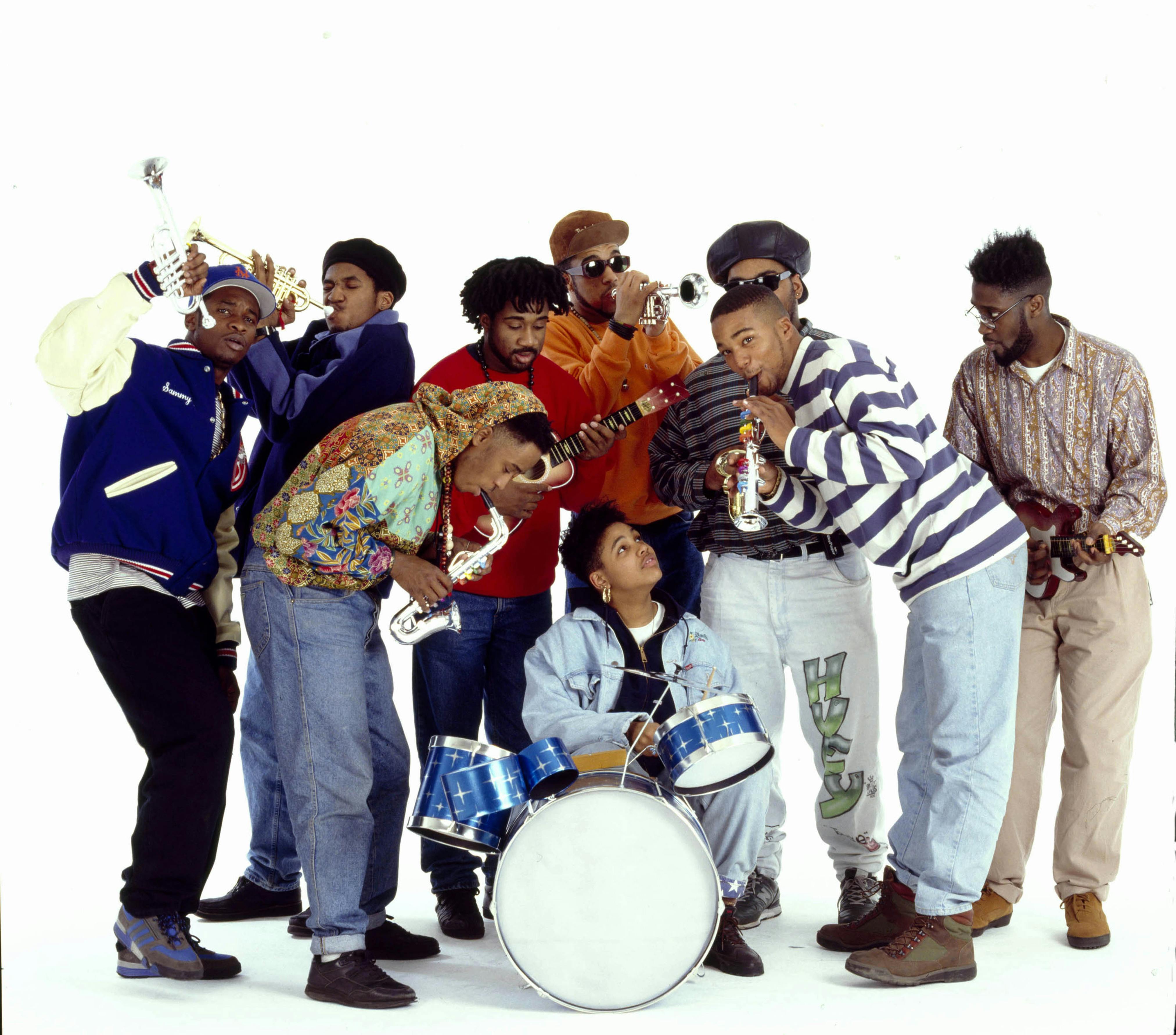
Legacy
Q-Tip: I always wanted to make something as close to like The Beatles, or Earth, Wind & Fire, or Sly [Stone] as possible for Hip-Hop. You know what I mean? I felt like that first album is kinda representative of that kind of energy. And to really not purposefully try to fit into something. Just be yourself. Be open. I think that first album was about those things, really.
Tyler, The Creator: I wouldn’t exist without — come on, Q-Tip is truly the Yoda of the pocket I exist. You had Native Tongues and all this stuff, and you had, like Wu-Tang, and you had NWA, and then you had the intellectual [rap] that KRS-One was… so at that time, you’re 18, you’re finding the pocket that you’re gonna live in. And Q-Tip and them — backpack dudes, fuckin’ tie-dye shirts and stuff, wearin’ beads and shit — it’s really important.
Talib Kweli (Black Star): Hip-Hop was an underground club, a family. You had to be down by law to know the language and the personalities. No group of artists made me feel more a part of the Hip-Hop family than the Native Tongues crew. At a time when even the realest Hip-Hop personalities seemed like caricatures of themselves at best, the Native Tongues crew came through and made me feel like it was okay to just be myself.
The core, original members of Native Tongues — JB, De La, and Tribe — shared a common vision when it came to music and fashion. They all had late '80s, downtown New York City afrocentric sensibilities that permeated both the music that they made and the clothes that they wore. As they brought in more artists, it became clear that it wasn’t mandatory to dress like De La Soul were to be in the Native Tongues, you just had to be true to yourself. The bond that this incredible group of artists had was a musical one and it inspired me to no end.
My debut album, Mos Def and Talib Kweli Are Black Star, is soaked in the influence of the Native Tongues crew. It is quite literally our take on what De La, Tribe, and Jungle Brothers were doing years before us, with a little Big Daddy Kane/Slick Rick/Rakim-esque lyricism thrown in for good measure.
Q-Tip: We were able to express that we’re more than one dimension. That we don’t just do X, we do A and D and H and J, and you know, just like everybody else. Just like everybody else. Because we were kinda like if the first to have that position about showing our complexities, and showing our levels, and showing our depth, I think that’s probably why you see J. Cole and you see Kendrick. It’s outputs of that.
Trugoy: You had some successful groups trying to maintain their own careers and we were all over the place. Jungle might have been in Germany and we're somewhere in Florida and Tribe and them or in LA and of course we were friends when we got together if time permitted to do songs, we did them. And it was never a forced situation. "Award Tour" happened because we was just recording in the same studio, "Yo, come down the hall and write a chorus." So you go down the hall and you listen to the track and you write a chorus. "Yo, you guys want to do a song? We're in the city." "Cool, let's go and just see what y'all doing. And things were just happening like that. And it's kind of cool that we do have those type of things.
It isn't a long list of catalog, but you're talking about just friends who are just happy to make music with each other. Yeah, nothing ever strategic, nothing. Never like, "Yo, we got to do this." Of course we sat down. There were times when we sat down talking about doing tours, we sat down talked about doing even merchandise at one time. The whole Native Tongues things could have been even a Broadway play we had talked about. But for some reason or another, everyone had their own careers and were pursuing them and trying to master their steps and time didn't permit for it to happen a lot, but for the time that we did do things and did create songs, we just had people enjoy that.
DJ Red Alert (KISS FM): People consider them as the hippie of Hip-Hop. They’re not the hippie of Hip-Hop, they’re considered the new funk. The new Funkadelic. The new Parliament.
Dante Ross: They wanted to create their own version of Parliament-Funkadelic, because Parliament was a group, Funkadelic was a group, and they became Parliament-Funkadelic. And their version of that was Native Tongues.
Being at that De La thing in New York a couple of months ago, that might have been the most powerful statement about the Native Tongues in a decade or maybe two decades. It was the Native Tongues in full effect. And Mike Gee is right here, and Q-Tip's over her,e and Dres is here, Latifah's here, and Common's here, and De La's rocking. And their records are finally getting unleashed to the world. And it felt like a celebration of not only De La Soul, but the Native Tongues. And I think Dave Chappelle might be in the Native Tongues now.
Pharrell Williams (Artist/Producer): That whole Native Tongues organization set so many of us free. At the time I was skating. De La Soul. A Tribe Called Quest. Jungle Brothers. Black Sheep. Latifah was in there. KMD. Leaders (Leaders of the New School) were in there, too. All of that energy set us free.
Sources:
490 Keep it Jungle with Bam of Jungle Brothers
Q-Tip Kanye & Common Evolved from Native Tongues
Sadat X talks working at a hospital, Native Tongues, Wild Cowboys, and his Brand Nubian Classics
Will.i.am Shares The Impact Of Native Tongues & ATCQ On The Black Eyed Peas People's Party
Black Sheep's Dres & Chi-Ali Share How Native Tongues Was Formed
What Had Happened Was
Black Sheep's Dres & Chi-Ali Share How Native Tongues Was Formed
Rock The Bells Radio Influence of Hip-Hop
Chris Lighty Interview Violating The Game (Part 1) (2011)
Red Bull Music Academy
Rap Radar
Atlanta Journal Constitution
De La Soul Discuss Native Tongue Tension Playing Out on Buddy
My Expert Opinion
Heat Rocks
Fort Worth Star Telegram
Apple Music
The Guardian
See the Native Tongues reunion at the Rock The Bells festival.

